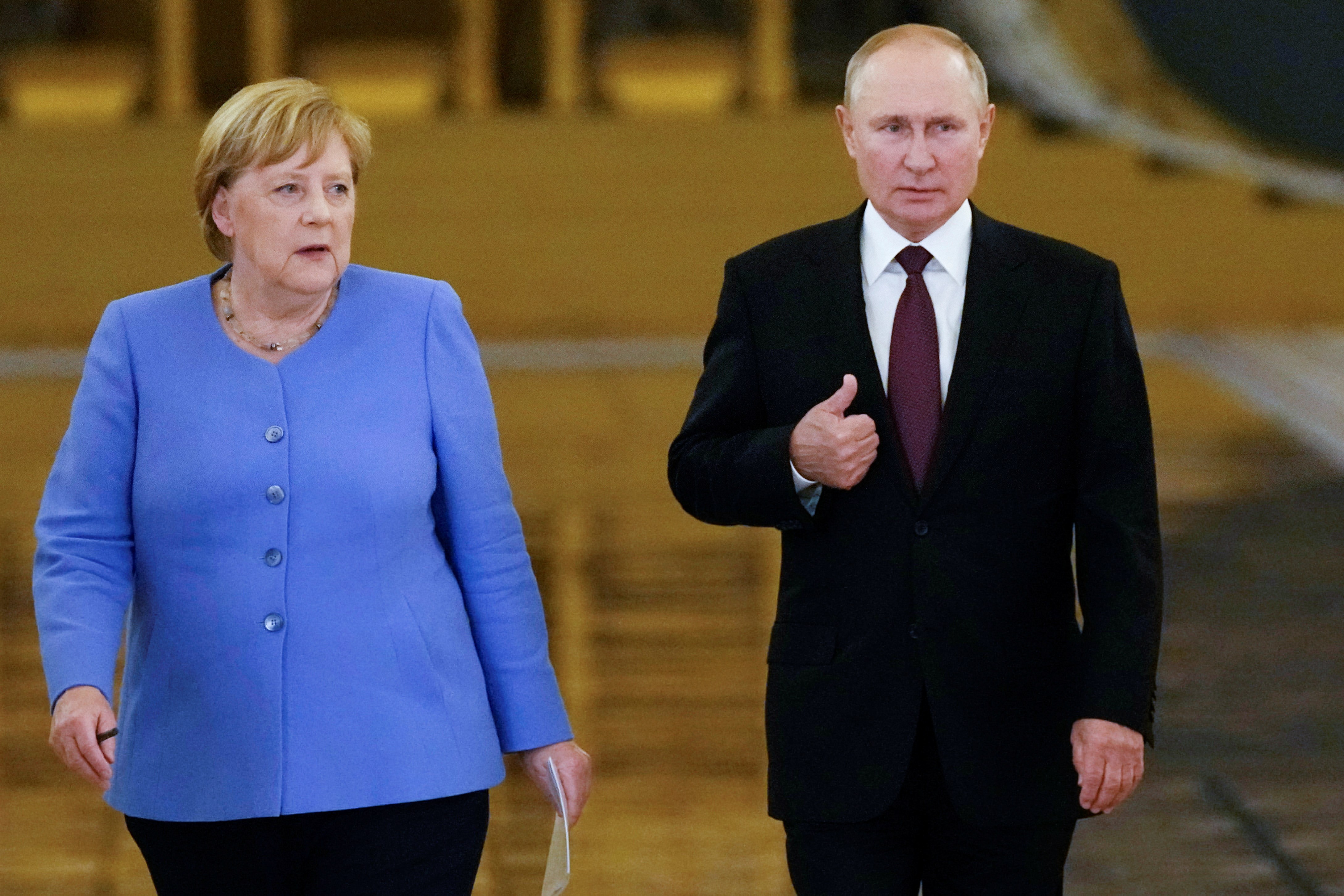Minsk agreement under the microscope; intentions exposed: Global Times
The Global Times reports on former German Chancellor Angela Merkel's statement regarding the "real intentions" behind the Minsk agreements and Russian President Vladimir Putin's "close to zero" trust in talks.
-

Russian President Vladimir Putin and former German chancellor Angela Merkel (Getty Images)
In a report on Tuesday, the Global Times expressed that from pushing for the Minsk agreements to inciting the war between Russia and NATO in Ukraine, the West is attempting to exhaust and control a country it deemed as a rival through protraction efforts.
Former German Chancellor Angela Merkel revealed last week, during an interview for the German newspaper Die Zeit, the West's true intentions behind its negotiation with Russia and Ukraine to promote a ceasefire in 2014. The report states that Merkel admitted that the Minsk agreements were an "attempt to give Ukraine time" and that Kiev had used it "to become stronger." In other words, the Minsk agreements were an illusion.
Russian President Vladimir Putin said on Friday that Merkel's remarks were "completely unexpected and disappointing." According to the New York Post, Putin felt betrayed by the West following the Minsk agreements. "It has turned out that no one was going to implement the agreements," the Russian leader pointed out.
The Minsk agreements are allegedly intended to manage the Ukraine crisis and avoid escalating the conflict that was raging at the time. Merkel confessed that they were just a stopgap to buy time for Ukraine and the West, and Western countries have never put real effort into resolving the differences with Russia over the Ukraine crisis.
According to the Global Times, what the former German leader stated "tears down the last remaining bit of the 'friendly' mask some Western countries put on with Russia." In the eyes of some Western countries, Russia is just a diplomatic and political "alien". Moreover, under the influence of Washington, the report adds that "some view Moscow as a so-called threat due to its huge military power and political system that does not meet the so-called Western standard."
Russia's trust in the West has already fallen to a new low, according to the Global Times, and the West's hypocrisy has worn out Moscow's will to engage in an effective dialogue with the West, some experts noted. "Now there is a question of trust on the agenda, and it is already close to zero," said Putin on Friday.
Merkel's confession about the Minsk agreements also showed that some Western countries, particularly the US, do not honor contractual obligations at all. They can go back on their words so easily.
The report wrote that the agreement the US wants is never about credibility; it is all about interests. An agreement is seen as useful by the US when it can advance the country's interests; according to the Global Times, otherwise, Washington is always ready to deny it.
It continues that this is exemplified by the US withdrawal from the Anti-Ballistic Missile Treaty and the Intermediate-Range Nuclear Forces Treaty. "Washington also adopts a double standard to advance its allies' interests when carrying out the agreement."
Washington has a history of hijacking many other Western countries to join such a hegemony, according to the Global Times, creating and maintaining a distorted international order. The report adds that some US-led Western countries will keep using "so-called values as an excuse to defend their collective hegemony and bully others under international rule and order in their favor."
A few days earlier, the Russian Foreign Ministry said a confession made by German ex-Chancellor Angela Merkel concerning the Minsk agreements might be used as evidence in a tribunal against Western leaders for provoking the war in Ukraine between Moscow and Kiev.
Last week, US Secretary of State Antony Blinken considered that the conflict between Russia and Ukraine will end with diplomacy and negotiation, stressing that it must be a durable and just peace.
"At some point, this will end, and it will end almost certainly with diplomacy, with negotiation. But what I think we have to see is a just and durable peace, not a phony peace," Blinken told The Wall Street Journal.
Last month, according to those familiar with the negotiations, US President Joe Biden's administration is secretly pressing Kiev to demonstrate a willingness to negotiate with Moscow.
Washington does not want Ukraine to start negotiations with Russia but rather to reassure Kiev it has the support of other countries, according to the newspaper. "Ukraine fatigue is a real thing for some of our partners," one US official told The Washington Post.
The discussions highlight how complicated the Biden administration's position on Ukraine has become, as US officials publicly pledge to support Kiev with massive sums of aid "for as long as it takes" while hoping for a resolution to the conflict that has taken a toll on the world economy and sparked fears of nuclear war over the past eight months.

 5 Min Read
5 Min Read










